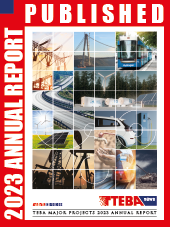12/28/2016
Deputy Prime Minister Mehmet Şimşek Reviewed the Economy in 2016
"2016 was a difficult year. The political tension with Russia had serious economic impacts. Terrorism went astray in coalition, which caused a very difficult period of struggle against terrorism. The overview shows that even agriculture was not supporting due to bad weather conditions
In the first quarter of next year, constitutional amendment will be a significant item in the agenda. The rumble, arguments and uncertainty caused by it may have a certain impact but Turkish economy may recover thereafter. The measures for the real economy, which we have not announced yet, will be clearly felt in the second quarter of next year
The current risk exposure is open position. It is our top priority to find ways of how we can help the real economy manage this risk. We will consider the matter from the viewpoint of companies. We will discuss the measures against currency risk at the Financial Stability Board."
Deputy Prime Minister Mehmet Şimşek reviewed the economy in 2016. "2016 was a difficult year. Nevertheless, Turkey showed a great resistance," said Şimşek, reminding that the challenges in the economy have multiple dimensions, which include those caused by the political tension with Russia through tourism and trade this year. Also reminding that a coup attempt was made, Şimşek said that even agriculture was not supporting due to adverse weather conditions in addition to the upsurge of terrorism in coalition, causing a very challenging period of struggle. Stating that the global economic growth has dropped below 3 percent and global trade has declined to about 1.7 percent, Şimşek said: "We started 2016 with a great volatility lin markets, because it was a period of collapse in commodity prices when the path of global interest would be very different. Now I can't help but think: could it be any worse in 2017?" Pointing out as positive developments that the normalization process with Russia is underway and that they have accelerated the reforms in the second half of the year, Şimşek said: "One can say that everything is a mess but no one would look at the full side of the glass. The reforms already show their impact in medium and long term. Still, it is important to fill the glass since this is what matters when the conditions normalize and things tend to settle to a certain extent. This will make a story to tell. The fund flow and investments in Turkey from abroad are facilitated by stories. You must have a story." "The measures that we have announced for the real economy are likely to be felt strongly in the second quarter if not in the first quarter" Noting that there is a slight action in the capacity utilization rate and credit volume in the final quarter of the year, Şimşek said: "This is what I believe: the measures that we have announced for the real sector - particularly the credit volume, which is very important - will be strongly felt in the second quarter of next year if not in the first quarter". Pointing out that the constitutional amendment would be a significant item in the agenda next year, Şimşek said: "The rumble, arguments and uncertainty caused by it may have a certain impact but Turkish economy may recover thereafter." Also pointing out that there are different risks and threats around the world, Şimşek mentioned the expectations formed by the elections in the United States, FED resolutions, appreciation of USD, recovery in petroleum prices, and the ongoing chaos, terror, and warfare in south as these risks and threats. Şimşek also said that he considered certain risks arising from geopolitical tensions immediately around Turkey as more manageable compared to the previous year. "We will discuss currency risk at Financial Stability Board" In response to the question about the depreciation of Turkish Lira, Şimşek said that the problems are of structural nature and required structural solutions. Şimşek made the following statement: "Of course the foreign exchange rate has certain impact but foreign exchange rate has multiple dimensions. For instance, it affects the inflation in upward direction to a certain extent albeit with delay. As a matter of fact, it also affects current deficit. As Turkish Lira appreciated with the stability in Turkey in 2000s, people found it attractive to borrow in foreign currency. This is a problem now. We prevented and restricted this risk under macroprudential measures for household in 2008. There are certain small restrictions on companies but they are not at a desired level yet. We are seriously working on it. The Financial Stability Board will convene under my presidency soon. There we will discuss the matters such as what we can do, how we can manage this risk, and what kind of measures we can take to prevent this risk from growing further." Şimşek further said: "The current risk exposure is open position. It is our top priority to find ways of how we can help the real economy manage this risk. We will consider the matter from the companies' point of view. This risk depends on data. You should have a strong and healthy database. You should be informed even at company level. Then you should work out how you can manage this in your own financial sector and derivative markets. Even awareness matters. I mean, on how to manage these... also on how we can create a macroprudent framework. Our perspective will be under these 3 titles."
Annual Report
